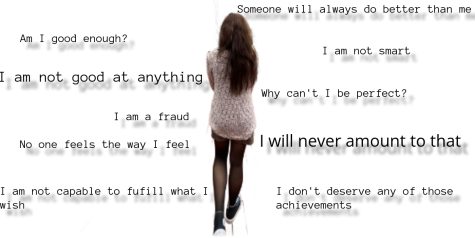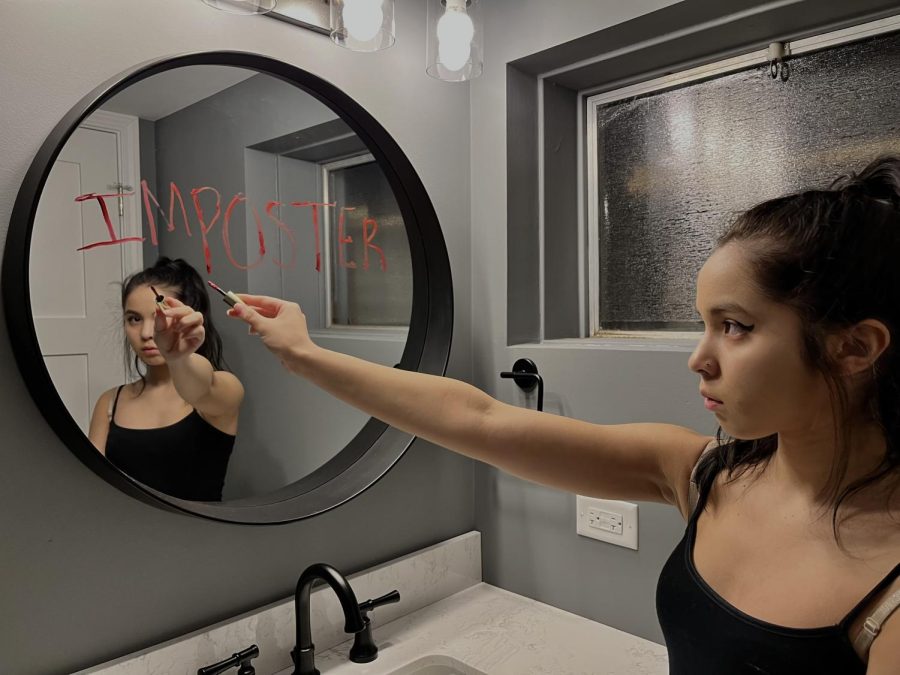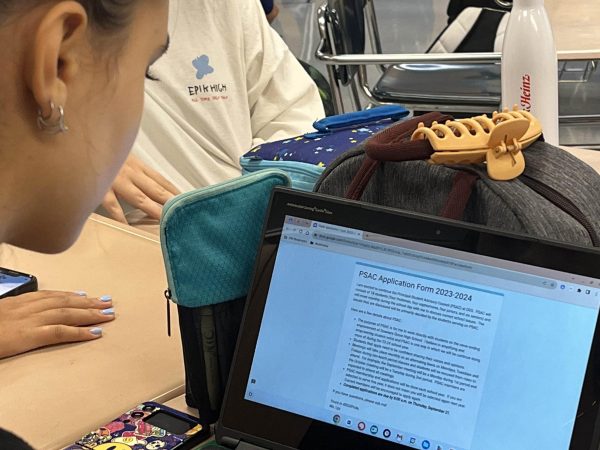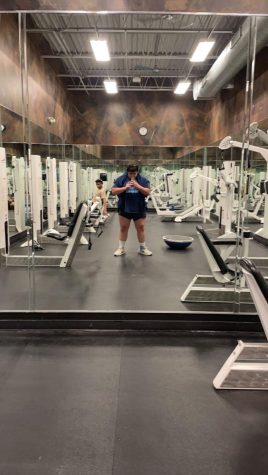Imposter syndrome: the fraud that lives in all of us
Imposter syndrome can affect how we view ourselves in our daily tasks and overall perception of our identity.
November 17, 2022
Staring into the reflection of a glass mirror, she saw what appeared to be her: a strong woman who worked hard for the things she’s earned in life, yet it was a reflection she did not know, one she felt as if she did not deserve.
According to WebMd, this hypothetical situation is a template for 70% of people in today’s world that have felt a symptom of the psychological phenomenon imposter syndrome. A person who has imposter syndrome can be described as feeling as if they are not as capable as others think and fears that they will be exposed as a fraud.
Although there could potentially be contributing factors to make a person more vulnerable and susceptible to feeling like a fraud, imposter syndrome targets people equally. Psychology teacher Bryan Szweda is aware that this syndrome and who it affects has often been misconcepted in the majority of individulas.
“At one point it was believed that more females than males suffered from imposter syndrome, which has some kind of cultural origins if we look historically at how females have been treated and their role in the workplace. Studies have disproved that, though; males and females are equally likely to suffer from imposter syndrome and the numbers are staggering with the people that at some point in their life do suffer from [imposter syndrome],” Szweda said.
It applies to real people in the daily motions of life. Senior Josh Traugott is just one of many that have felt the repercussions of how imposter syndrome can make someone feel and doubt their own ability and skill.
“I do randomly think to myself if I’m good enough in some of the things I’m passionate about: running on varsity, creating videos and music and college prep because I don’t feel as qualified as others. I’m grateful for the experience I have, but I just feel like I’m winging it on some occasions,” Traugott said.
I do randomly think to myself if I’m good enough in some of the things I’m passionate about: running on varsity, creating videos and music and college prep because I don’t feel as qualified as others. I’m grateful for the experience I have, but I just feel like I’m winging it on some occasions
— Josh Traugott
So what could be a possible attribution to have a person feel this kind of way? There are a lot of possible unconscious factors that can contribute to the likelihood of feeling the symptoms; for example, social media. Szweda agrees that a lot of the unconscious feelings and motives can arise from social media and the crippling effect that it can have on people.
“I think that with the invention [of social media], that can absolutely lead people into feelings that they are inadequate and are an imposter because that’s not real. The things that people post are what they want others to see, and they are not going to post their own doubts about themselves. I think it’s easy to look and think everyone else has totally got this, so it must be me, and only me that feels this way,” Szweda said.
Although imposter syndrome is not an official mental health condition, it can often be associated with anxiety and paired with depression. According to Mental Health First Aid, suicide is the second-leading cause of death among people aged 10-34 years in the U.S. and the 10th leading cause of death in the U.S.

Age is another factor that has no dependence on who can feel symptoms of imposter syndrome. Sophomore Adrian Ziomik has had some struggles with his mental health and from a young age always felt like he could never live up to his older brother.
“I kind have always felt like I have been compared [to my brother]. It was hard especially when I was younger to just kind of live underneath his shadow. I’ve felt like I was never going to be enough and that anything I achieved was less important because what he did was always more,” Ziomik said.
Counselor Tim Christy takes into account that there could be many reasons why a person may fall down the hill of self doubt and inadequacy because all people are different and have lived through varying life circumstances and experiences.
“I suppose every person is a little bit different and somebody who lacks the self-confidence to know that they are able to take on a challenge that they haven’t taken on before is probably prone to show more signs of imposter syndrome. I think a person who goes into a situation, whether it be a class or something else where they aren’t as self-assured, are more likely to feel things like self-doubt and imposter syndrome,” Christy said.
Lacking a full sense of self-confidence is a dilemma sophomore Natalie Thil continuously feels as if she is invalidated by the voices of the imposter that roam through her head when approaching situations in her life.
“I sometimes just have to remind myself of how far I have come and how hard I have worked. It’s something that I face everyday to validate myself for the version I am today. But I just continue to tell myself that I deserve to be happy and that I am worthy,” Thil said.
I sometimes just have to remind myself of how far I have come and how hard I have worked. It’s something that I face everyday to validate myself for the version I am today. But I just continue to tell myself that I deserve to be happy and that I am worthy.
— Natalie Thil
Fortunately, the battle of imposter syndrome is not indefinite, there are ways to fight these voices.
“I think I have kind of learned that everyone feels [the symptoms of imposter syndrome], which kind of helps me remember that it’s not just me. Something that I learned in therapy that has stuck with me was that no one is ever going to provide me with my own self-worth, I have to create that and embrace it myself,” Thil said.











